Leaders, teachers, advocates… and a clown.
Haligonian speakers embrace possibilities, captivate audience.

1. “Cities are complex, they live and breathe just like people.”
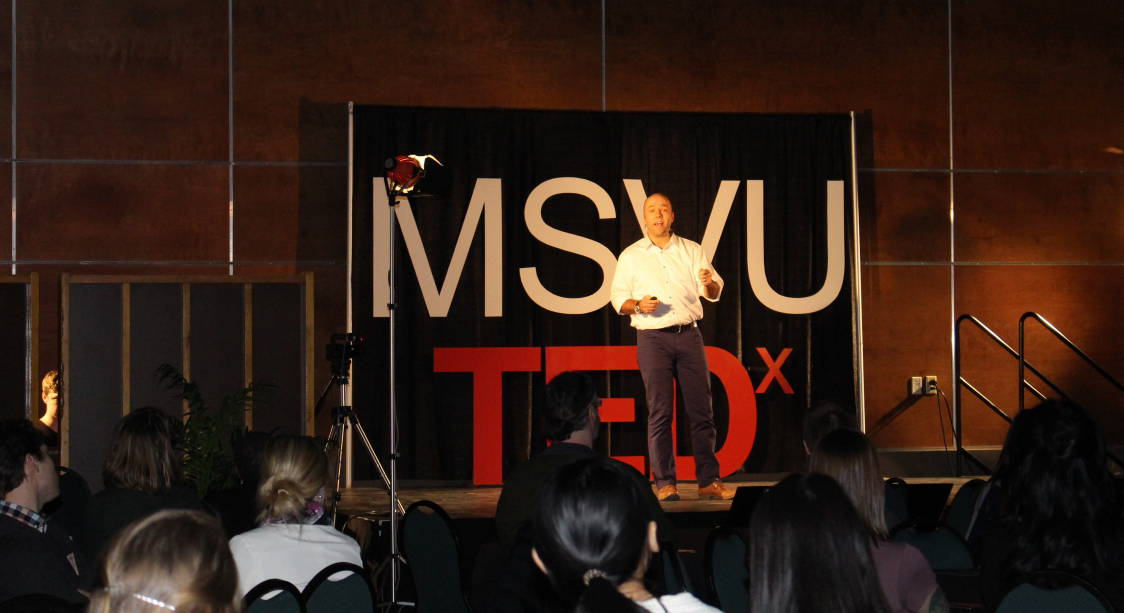
Andy Fillmore, Vice President, Waterfront Development Corporation, shared the story of Halifax. The moral of his story was that we’ll never rebuild Halifax unless everybody takes an active role. “You can’t make change unless you feel the love of the community.”
2. “It’s taking a moment to see the light within that child.”
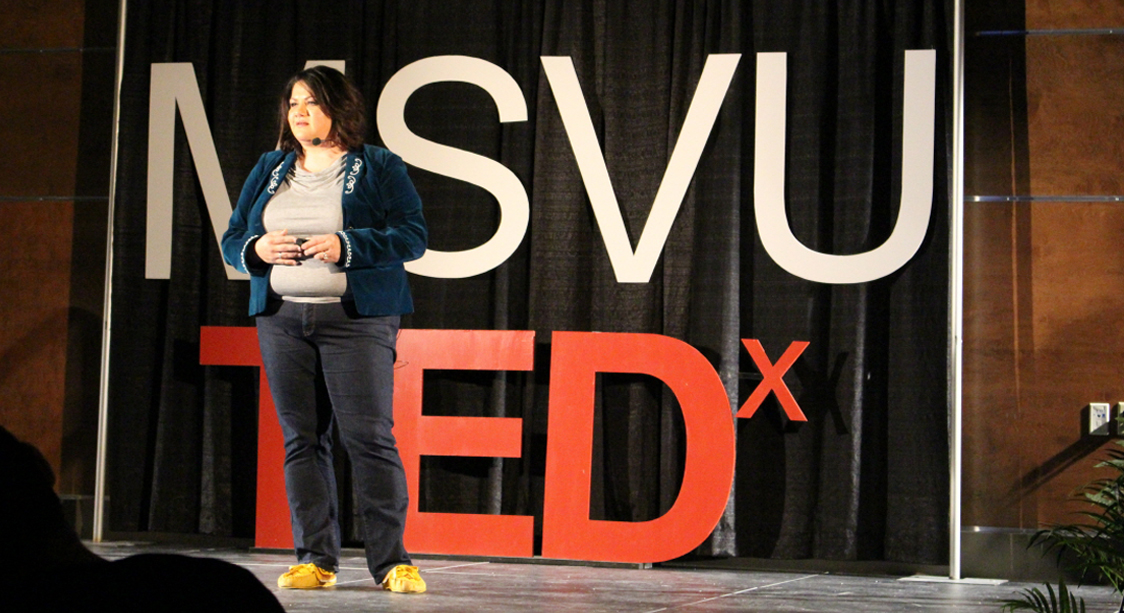
Janean Marshall, Student Services Counsellor, Mi’kmaw Kina’matnewey discussed exploring the possibilities within autistic children. She shared her journey of finding never ending patience and tolerance and her realization that she had been overlooking the light within her autistic son. “The possibilities are endless in terms of how he will be able to communicate, to show his light to the world.”
3. “If you want something badly enough you can do anything in 30 days.”
Matt Cutts, a Technologist at Google encouraged the audience to try something new for 30 days. “When I made small sustainable changes, they were more likely to stick.” He trying biking to work, writing a novel, and even climbed Mount Kilimanjaro. “What are you waiting for?” Matt’s Video is available here.
4. “I challenge you to learn more about each other, to learn about starting a journey of cultural competence.”
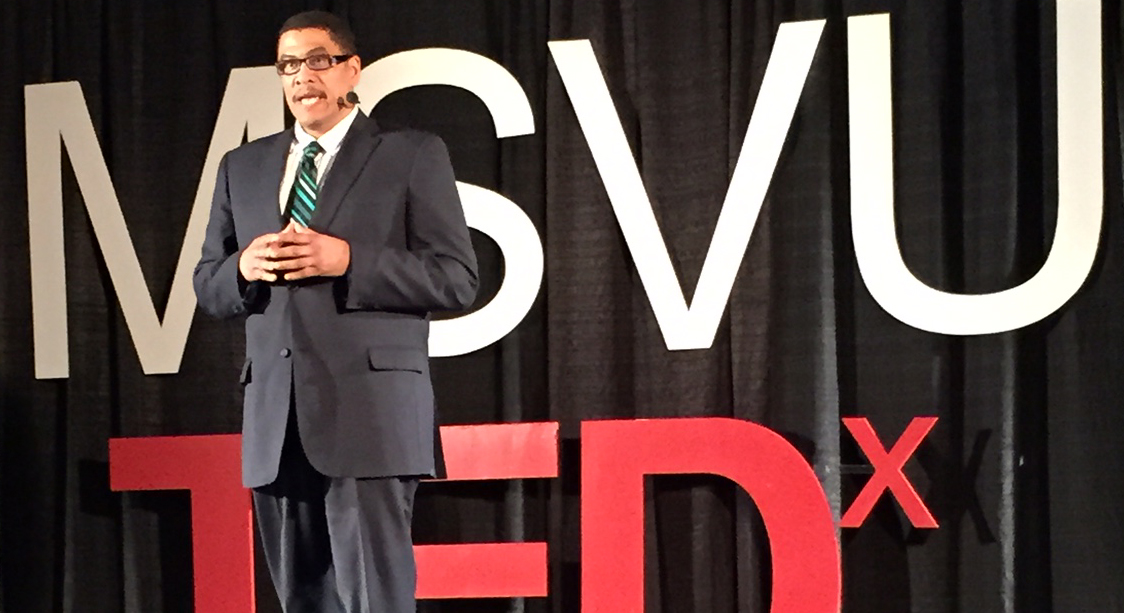
Craig Smith, Author and Royal Canadian Mounted Police, spoke to the idea that it is important to acknowledge multiculturalism in the police force. Putting yourself in someone else’s shoes can help eradicate racism within an organization. “We have a lot more commonalities than differences.”
5. “I changed the script. I changed the focus of leadership to create a space where every voice matters, where people work together because they believe in embracing the possibilities of change.”
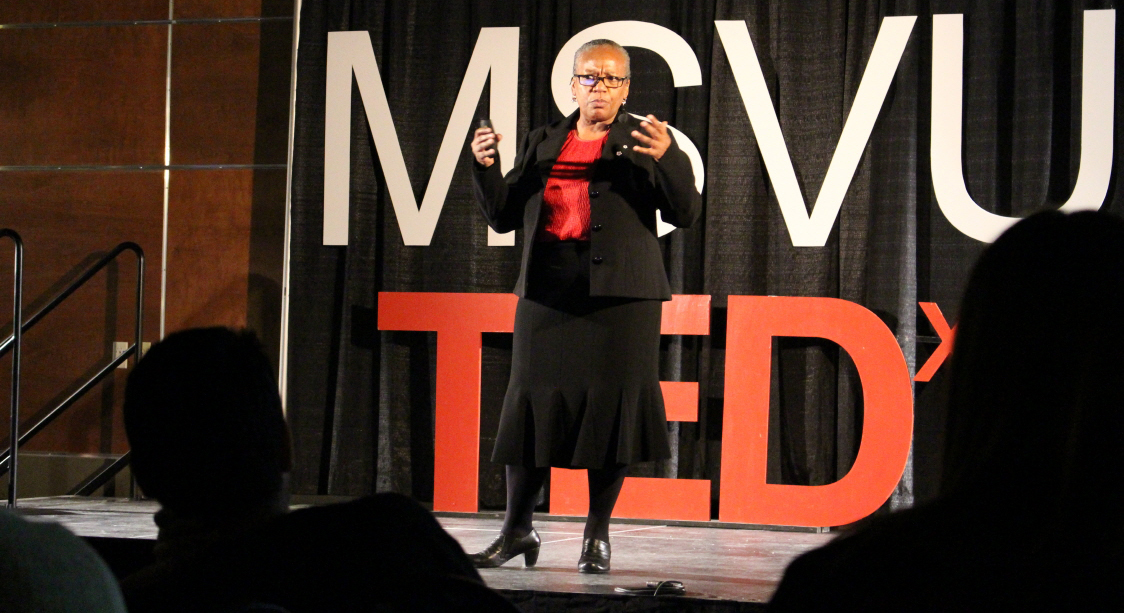 Wanda Thomas Bernard, School of Social Work at Dalhousie University, shared her story of overcoming sexism and gender role expectations in the workforce. Growing up she didn’t believe she could become a leader – it wasn’t until she had the faith of a mentor that she finally believed in herself. “We believe that you can do it, you just need to believe that you can to.”
Wanda Thomas Bernard, School of Social Work at Dalhousie University, shared her story of overcoming sexism and gender role expectations in the workforce. Growing up she didn’t believe she could become a leader – it wasn’t until she had the faith of a mentor that she finally believed in herself. “We believe that you can do it, you just need to believe that you can to.”
6. “We should be spending our time investing in the potential that every young person comes into this world with.”
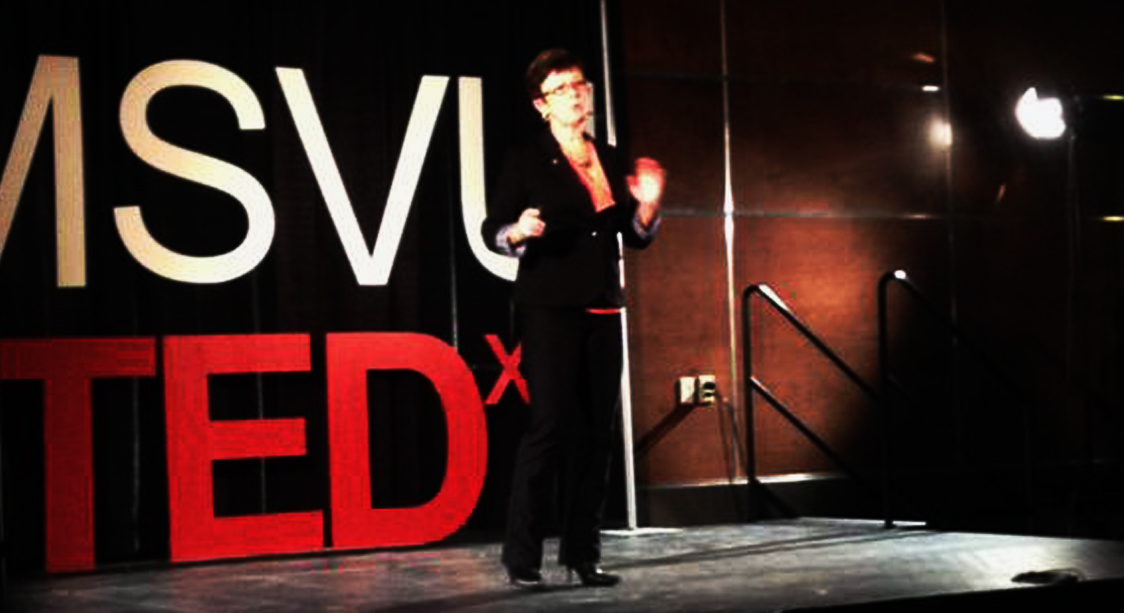 Bette Watson-Borg, President and CEO of YMCA of Greater Halifax and Dartmouth believes that when you are in the presence of someone who is younger than you, it is worthwhile to stop and see how you can help. “There was that one adult in my life that made such a difference in my confidence” and that person was her uncle who gave her encouragement and entrusted her with responsibility.
Bette Watson-Borg, President and CEO of YMCA of Greater Halifax and Dartmouth believes that when you are in the presence of someone who is younger than you, it is worthwhile to stop and see how you can help. “There was that one adult in my life that made such a difference in my confidence” and that person was her uncle who gave her encouragement and entrusted her with responsibility.
7. “Learning is the greatest thing that lies behind who we are as human beings.”
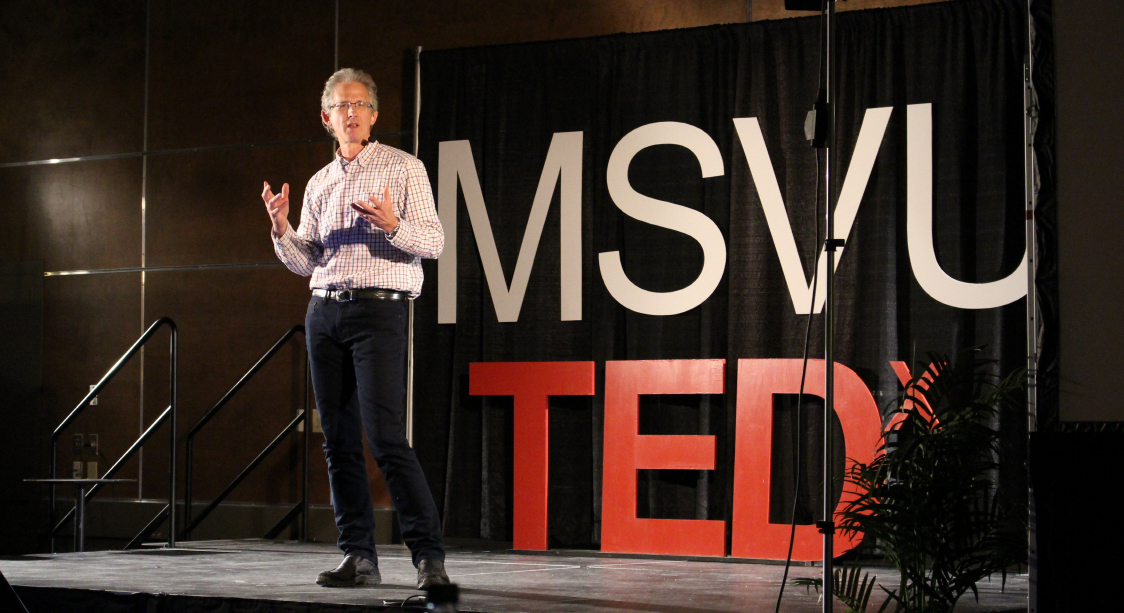 Donovan Plumb, Coordinator of Teaching and Learning Centre, Mount Saint Vincent University explored the idea that learning is a collaborative process; that learning is about mutual agreements of meanings that are carried across generations. “What makes us incredible as a species is that we can share our experiences with each other…This is the adventure that you become a part of when you come to a university.”
Donovan Plumb, Coordinator of Teaching and Learning Centre, Mount Saint Vincent University explored the idea that learning is a collaborative process; that learning is about mutual agreements of meanings that are carried across generations. “What makes us incredible as a species is that we can share our experiences with each other…This is the adventure that you become a part of when you come to a university.”
8. “They asked me what I wanted to be, then told me what not to be. I was being told to accept the identity that others gave me.”
Shane Koyczan, poet and writer, shared the struggle of self-identity and standing up for yourself in the face of adversary. He encouraged the audience to following their dreams and rise above those who wish to bring you down. “My dreams got called names too, silly foolish, impossible.” Shane’s video is available here.
9. “One of the most troubling things is that autistic people are often not brought into the conversations that involve them.”
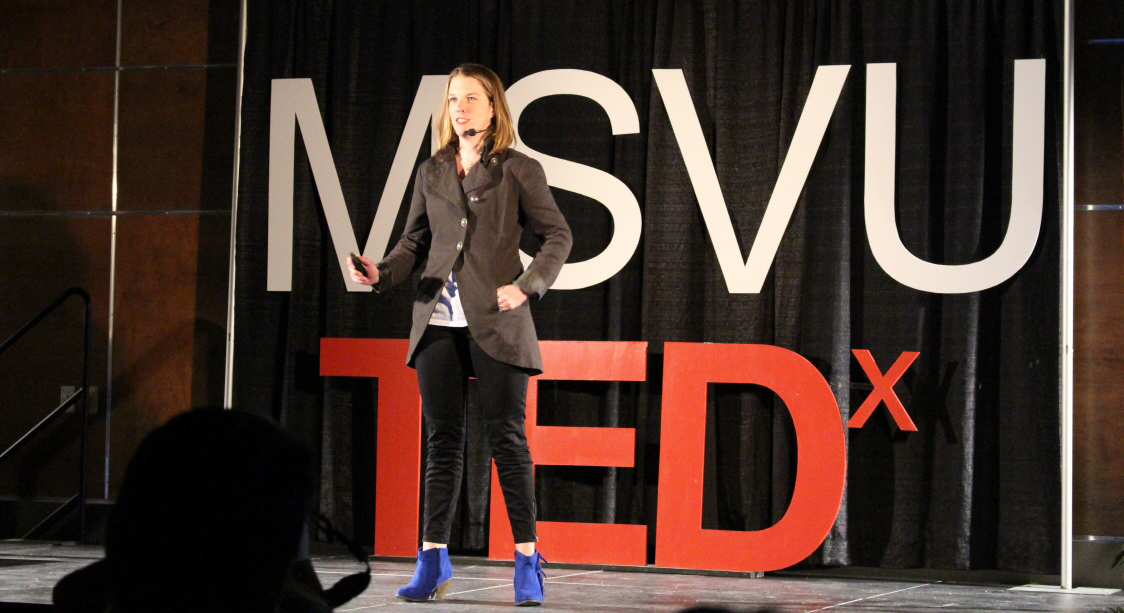 Allison Garber, Owner of Allison Garber Communications, discussed her experience as a mother whose child had been recently diagnosed with autism. She spoke about her son, Hugh, who is just as lively and happy as other “neurologically typical” kids his age and the importance of the need for increased support to those with autism. “One day we will be able to give these kids enough support that they can walk the path on their own.”
Allison Garber, Owner of Allison Garber Communications, discussed her experience as a mother whose child had been recently diagnosed with autism. She spoke about her son, Hugh, who is just as lively and happy as other “neurologically typical” kids his age and the importance of the need for increased support to those with autism. “One day we will be able to give these kids enough support that they can walk the path on their own.”
10. “Play is how we access creativity. Creativity is how we access innovation. Innovation is how we create new things and how we embrace possibilities.”
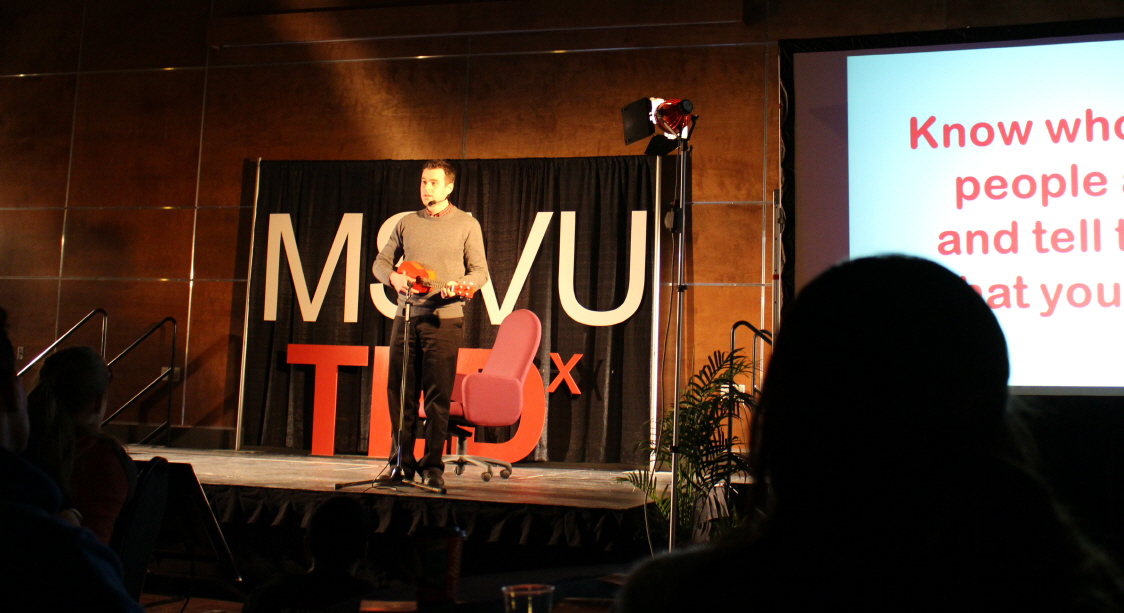 Cleve Sauer, Therapeutic Clown, IWK Health Centre shared his experience interacting with children who experience the stress of health issues on a daily basis. By recounting these interactions, he illustrated how important playing can be and how telling others what support you need is essential. “There’s a quality that great leaders possess and it’s an honesty about yourself – an honesty about your own struggles and fear. I learned, from many kids, to be real.”
Cleve Sauer, Therapeutic Clown, IWK Health Centre shared his experience interacting with children who experience the stress of health issues on a daily basis. By recounting these interactions, he illustrated how important playing can be and how telling others what support you need is essential. “There’s a quality that great leaders possess and it’s an honesty about yourself – an honesty about your own struggles and fear. I learned, from many kids, to be real.”
Our Top 3 Tweets
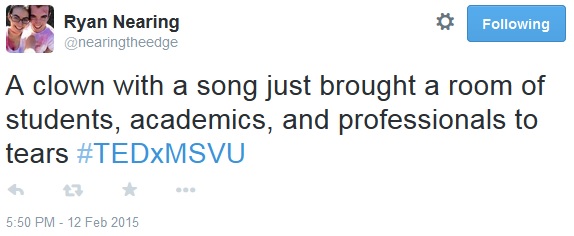
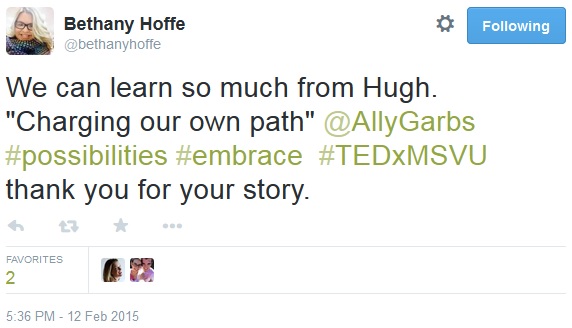
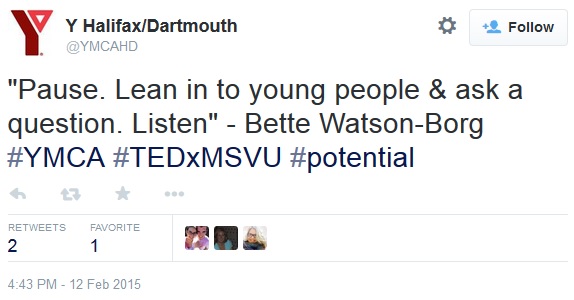
In the spirit of ideas worth spreading, TEDx is a program of local, self-organized events that bring people together to share a TED-like experience. At a TEDx event, TEDTalks video and live speakers combine to spark deep discussion and connection in a small group. These local, self-organized events are branded TEDx, where x = independently organized TED event. The TED Conference provides general guidance for the TEDx program, but individual TEDx events are self-organized (subject to certain rules and regulations).
Special thanks to TEDxMSVU organizers (including host William Murray), volunteers, speakers and their supporters for an inspiring event. Thank you to Shannon Kennedy, Paige Reid, Salma Saleh, Jena McCulloch and Amber Ciolfe for their contributions to this article.
